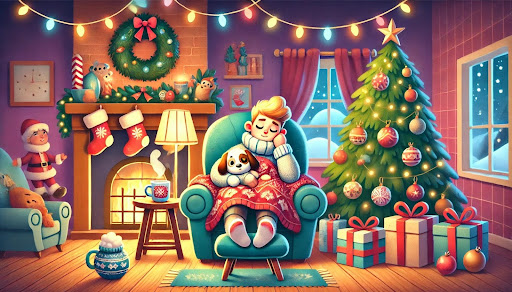
Dec 17 2024
Holiday Survival Guide: Celebrating with Narcolepsy
h in Blogs
Written by Tatiana Maria Corbitt, MS
I have been living in the Pacific Northwest for three years now, and it has been lovely for many reasons (peep those glorious, tall, evergreens!) However, the grey and gloomy winters are brutal. The sun sets earlier and earlier with each passing winter day, and I get sleepier and sleepier. Regardless of how sleepy I am, though, the holiday season must go on!
We all know the challenges of living with Narcolepsy during the holiday season – the fatigue, the constantly disrupted sleep patterns – and the resulting difficulty staying awake during festive activities. The truth is that living with Narcolepsy can feel unfair and isolating at times. This is especially true during the holidays, where sunshine is limited and schedules become busier and more frantic.
Excessive Sleepiness and Its Isolating Effects During the Holidays
While the holidays are meant to be filled with parties, family gatherings and bustling social events, the excessive sleepiness can make it difficult for us to fully engage in these activities. For many of us, the intense exhaustion is not something easily understood by others. Sometimes family members are not supportive, which can contribute to our feelings of being disconnected or left out.
During holiday parties or family dinners, where energy and excitement run high, I will inevitably find myself struggling to stay awake or alert. The inability to fully participate in conversations or games can lead to feelings of social exclusion—as though I am physically present but mentally absent. Not to mention, the need to take frequent rest breaks, or even sneak in a nap or two, can cause us to miss out on important moments of holiday bonding.
This disconnection can feel especially strong when surrounded by loved ones who might not fully understand the invisible nature of Narcolepsy. When someone has to leave early from a festive gathering or retreat to a quiet room to rest, they may feel guilty or embarrassed, worried that others will think they’re uninterested or unsociable. Family members may also make these claims, increasing the feelings of guilt and shame surrounding our condition. This lack of empathy from others can lead to feelings of loneliness and isolation during what is typically a season of togetherness.
It’s easy to feel pressured to keep up with the high energy holiday traditions—decorating, shopping, cooking, or attending events. This increased pace can feel overwhelming for those of us with Narcolepsy. As we struggle with our sleepiness, we may feel as though we are watching life go by from the sidelines while everyone else is enjoying the season’s festivities. This may cause us to feel as though we are unable to participate in life at its fullest. This sense of missing out on the joy of the season can heighten the emotional toll of Narcolepsy, making the holidays feel even more lonely and difficult to navigate.
A Narcolepsy Holiday Survival Guide: Tools for Self-Care
Prioritizing Rest
The holidays can be both joyful and overwhelming, but for me, managing my Narcolepsy during this busy season means prioritizing rest above all else. I’ve learned that it’s okay to recognize when my body needs rest, and that self-care isn’t just about treating myself—it’s about making sure I’m taking care of my physical and mental health so I can enjoy the festivities in my own way.
Consistent Sleep Routine
I’ve realized that honoring my need for sleep is one of the most important things I can do. While it’s tempting to push through the fatigue in order to be part of every holiday event, I know that if I don’t rest, my symptoms will get worse. I’ve found that sticking to a consistent sleep routine helps manage my energy. It might mean going to bed a bit earlier or taking steps to make sure my environment is quiet and restful—keeping the room cool, dark and free from distractions. This makes a big difference in how I feel the next day, especially when there are family gatherings or holiday activities on the agenda.
Scheduled Naps
Power naps have also become a lifesaver. I try to take short, planned naps throughout the day, especially before an event. I aim for just 15-30 minutes to recharge without feeling groggy, which helps me stay alert and engaged when I need to. I’ve learned to schedule these naps into my day, just as I would schedule any other holiday activity. This way, I can rest up and still participate in the parts of the season that are most important to me.
Boundaries
One of the biggest lessons I’ve learned as a person with Narcolepsy is how to set boundaries. During the holidays, it’s easy to feel pressure to attend every event or celebration. However, I’ve realized that it’s okay to say no when I need to rest instead. Sometimes that means missing a party or other gathering, but it helps me “show up” for myself. I try to manage my feelings of guilt about taking care of myself because I know that my well-being matters. Taking care of myself gives me the ability to show up for special moments, feeling refreshed and connected.
New Year, New Goals
In the end, even though my Narcolepsy makes me consistently low energy, I still try to find little ways to celebrate the holidays. After all, the holiday season marks the end of one year and the start of a new one. During these times I can reflect on the past year, and brainstorm goals for the next year.
Taking care of myself as a person with Narcolepsy is essential to my success. Therefore, as the year 2024 comes to a close, one of my goals is to continue to prioritize my health… not just during the holidays, but all year round!
I hope this year we can extend understanding and empathy towards ourselves and our communities as we continue to move forward and live our lives with Narcolepsy. In itself, that is enough.

